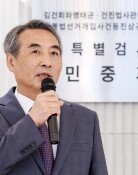[Editorial] Complicated Social Welfare Services
[Editorial] Complicated Social Welfare Services
Posted February. 23, 2009 08:11,
How could a Grade 8 technical civil servant at Yangcheon Ward Office in Seoul by himself have misappropriated up to 2.6 billion won (1.7 million U.S. dollars) in subsidies for the disabled? Lawmaker Won Hee-mok of the ruling Grand National Party gave a partial answer to this question at parliament last week. Considering the complicated welfare services system, it was inevitable that a series of cases of misappropriation and illicit and double reception of welfare subsidies have occurred, he said. The number of social welfare and health and medical services targeting those on basic welfare and the disabled is nearly 100, making it impossible for anyone, except the civil servant in charge, to trace the whereabouts even if budget is leaked.
The 15 divisions of the Health, Welfare and Family Affairs Ministry delegate as many as 100 types of social welfare services to 16 metropolitan cities and provinces, which in turn assign the services to cities, wards and counties. It is accordingly difficult for laypeople to know where to go to receive such services. As the welfare administrative system is obscure and centered on providers, chances are high that civil servants who have taxpayers money at their own disposal wield undue power and even misappropriate funds. The underprivileged, who should benefit from these services, cannot receive the aid they are entitled to unless they write to the president.
If this years social welfare budget of 13.4 trillion won (8.94 billion dollars) is managed in such a sloppy fashion, the problem truly deserves grave concern. Authorities must also check for irregularities in welfare services managed by other agencies, including unemployment insurance managed by the Labor Ministry, subsidies for rental homes by the Land, Transport and Maritime Affairs Ministry, and assistance for the self-employed by the Small and Medium Business Administration. The government might consider introducing a one-stop service system in which social welfare services are handled by a single agency in line with other countries having ample experience in this field, such as Britain.
As the ranks of the power rise amid the deepening economic crisis, the scale of welfare spending is set to increase further. Unless authorities fundamentally improve the social welfare delivery system, it will prove more difficult to eradicate corruption in social welfare administration. The transparency of welfare administration must be raised to make it easier to understand, and improvement is needed in service administration divided into different types to focus on providers in a way that they are focused on beneficiaries. Furthermore, the government must discuss measures to integrate the four social welfare insurances -- national pension insurance, health insurance, unemployment insurance and industrial injury insurance -- divided for administration by the National Pension Service, the National Health Insurance Corp., and the Korea Workers Compensation and Welfare Service. Korea must urgently reform its welfare system to ensure convenient public access to benefits, and to improve poor transparency and inefficiency in management.







